BLOGS

How Digital Agri Hub contributes to the ATIO Knowledge Base
Publish date: 30 octubre 2025
The 2025 World Food Forum (WFF) flagship event was held from 10 to 17 October at the Food and Agriculture Organisation of the United Nations (FAO) headquarters in Rome. I was pleased to contribute to the session “Discover the Future of Agrifood Systems with ATIO KB”. ATIO stands for “Agrifood System Technologies and Innovations Outlook,” and its Knowledge Base (KB). As Digital Agri Hub, we contribute to the ATIO KB by curating valuable information on digital solutions and providers across LMICs. I therefore illustrated the mutual benefits we see in this collaboration and future prospects.

Where are we at with digitalization for agriculture in Latin America and the Caribbean?
Publish date: 02 octubre 2025
The just-concluded Semana de la Agricultura Digital (Digital Agriculture Week) hosted by IICA (Instituto Interamericano de Cooperación para la Agricultura) and partners in San José, Costa Rica, offered a useful “compass” for where the region’s agri-digital journey is heading. Now in its fourth edition, the “Semana” keeps growing in scale and substance, drawing together the people who drive the agricultural digital innovation ecosystem across the Americas, including public agencies, researchers, farmer organizations, agtech founders, investors, and development partners. It has become an effective occasion for knowledge and experience exchange, as well as for fostering connections among key actors in the region’s ecosystem.

You Cannot Scale Digital Advisory Services Without People
Publish date: 26 septiembre 2025
Is there a world where digital agriculture advisory services - or any technology - can scale without community-based agents? The collective answer by D4Ag group participants was a resounding ‘no’. A 2024 publication from CGIAR noted that digital agriculture advisory services (DAS) applications have not become a mainstream practice anywhere nor are they expected to achieve 100 percent penetration any time soon. Why is that?

Navigating the Future: Diversification Strategies for Digital Agriculture Service Providers
Publish date: 15 mayo 2025
The agricultural sector is undergoing a profound transformation, driven by digital innovations such as artificial intelligence (AI), the Internet of Things (IoT), digital farm books and farm management information systems, . Precision agriculture is a management strategy which benefits from such digital innovations. Part of the agricultural world believes that precision agriculture is going to redefine traditional farming systems, equipping farmers with innovative tools for efficient resource management, accurate yield forecasting, and proactive disease prevention, others promote alternative forms of sustainable agriculture.

Unlocking the Promise of Generative AI in Agriculture: Insights from a Pioneering Webinar
Publish date: 14 abril 2025
The Digital Agri Hub’s webinar on “Unlocking Generative AI for Agriculture in LMICs” brought together perspectives from the Food and Agriculture Organization of the United Nations(FAO), Digital Green, Ubuntoo, Kissan AI, and the Digital Agri Hub to explore how GenAI can transform food systems in low- and middle-income countries. From AI-powered advisory services and multilingual chatbots to context-aware LLMs, the session highlighted real-world tools, ethical challenges, and scaling strategies. A strong call emerged for cross-sector collaboration, curated data, and inclusive design.

New challenges and opportunities for the European Agricultural Knowledge and Innovation Systems (AKIS)
Publish date: 06 marzo 2025
An AKIS can be understood as the combination of data and knowledge flows among individuals, organisations, and institutions who use, produce knowledge and promote innovation for agriculture and interrelated fields...

Aligning Agritech knowledge platforms to accelerate digital agriculture adoption in Europe and Central Asia
Publish date: 10 diciembre 2024
This article is a follow-up to the webinar hosted by JengaLab titled “From Knowledge to Action: The Impact of Agritech Knowledge Sharing Platforms on Evidence-Based Policies” on November 28, 2024. During the session, panellists Tomaso Ceccarelli from the Digital Agri Hub and Veronika Sherova from FAO Agritech Observatory presented their insights on why there is a need for greater collaboration between Agritech knowledge-sharing platforms...

The Evolution of the Digital Agri Hub Dashboard (Phase II): Regional Deployments & Emerging Insights
Publish date: 22 mayo 2024
The Digital Agriculture (D4Ag) landscape is undergoing rapid developments, generating transformative effects on global development across environmental, social, economic, and food security domains. At the forefront of tracking these developments and assessing the impact created by digital solutions lies the role of Digital Agri Hub. In 2022, the Hub reached a significant milestone, showcasing its dashboard offering transparent insights into D4Ag and digital innovations deployed in low- and middle-income countries (LMICs)...

Scaling Digital Extension and Advisory Services: “The Role of Intermediaries as Technology-Farmer Bridge Builders"
Publish date: 11 diciembre 2023
Scaling digital agricultural extension and advisory services for smallholder farmers in developing countries has proven to be a complex puzzle. Despite having the potential to provide valuable information to smallholder farmers and transform agricultural markets, many of these services have struggled to gain widespread adoption.

Unlocking the Potential of Digital Agriculture in the NENA region: Leveraging Digital Agri Hub’s D4Ag data and insights
Publish date: 14 septiembre 2023
At the core of agricultural transformation in the Near East and North Africa (NENA) region , the digitalisation for agriculture (D4Ag) plays an important role in its operations. Agriculture in the NENA countries is struggling with limited agricultural land and dwindling water resources, confronting the urgent demand for adaptation and efficient use of its resources in the face of climate change. ..

Digital agroecology, an Oxymoron?
Publish date: 13 julio 2023
Join us as we delve into the intricate relationship between digital solutions and agroecology. From precision farming technologies to ecological principles, we uncover the complexities and potential for transformative change in sustainable agriculture. Embark on this enlightening journey where technology meets sustainability...

Being a woman in D4Ag is no big deal
Publish date: 09 marzo 2023
Most agricultural deals are clinched by men in high-income countries and most finance is locked in by male entrepreneurs. Despite significant investments in the D4Ag sector over the years raising $26.1 billion by 2020, only 7 per cent of deals were bagged by women-led businesses...

Understanding the nexus between Digital Agricultural Advisory Services and Environmental Sustainability
Publish date: 09 febrero 2023
While improved agricultural productivity and income levels for small-scale producers (SSPs) especially in Low-and mid-income countries (LMICs) have been the primary goals of digital agricultural advisory services (DAAS), fostering environmental sustainability has been seldom an explicit focus...

Digital Agri Hub partners with Digital Impact Alliance
Publish date: 26 enero 2023
In a sector that is highly fragmented, synchronizing data prevents duplication of efforts while strengthening the potential of digital technologies and practices for agricultural development. Sowing the seeds of meaningful partnerships in the digital agriculture (D4Ag) sector is crucial to harmonizing data on digital innovations transforming agriculture...

Cooperative union turns digital to ease milk procurement in Tanzania
Publish date: 23 noviembre 2022
In Tanzania’s Tanga region, not far from the country’s business capital Dar es Salaam, Tanga Dairies Cooperative Union (TDCU) is a major buyer of milk from dairy farmers. With an extensive membership of over 6,500 mainly smallholder farmers, TCDU and dairy farmers face a major challenge as current milk production cannot meet the growing demand for dairy products by urban and semi-urban customers...

Strengthening policies and pathways to foster digitalization for agriculture in Asia
Publish date: 15 noviembre 2022
Digital innovations continue to reshape the face of agriculture across Asia, offering a vehicle to improve productivity and enhance information and market access. Accelerating digital transformation in agriculture is essential towards building resilient, sustainable and inclusive agri-food systems. Scaling digital solutions in agriculture, however, requires the support of Digitalisation for Agriculture (D4Ag, also referred to as ‘e-agriculture’) policies and strategies...

Digital tools set to drive the agricultural revolution in India
Publish date: 12 octubre 2022
India is poised to undergo a major transformation of the agriculture sector, by tapping into digital tools. Contributing 27 per cent to the GDP and a source of livelihood for 58 per cent of the country’s population, agriculture remains the backbone of the Indian economy. India currently ranks as one of the world’s top three countries in terms of agri-tech start-ups launched, and as a result of regulatory changes for Indian agriculture, agri-tech investment is expected to grow to a US$30–$35 billion market by 2025...

Digital Agri Hub Dashboard - Towards a transparent digital agriculture ecosystem
Publish date: 04 octubre 2022
Digital innovations in the agriculture sector continue to play a critical “enabling” role in transforming the livelihoods of 570 million small-scale producers (SSPs) in low- and middle- income countries (LIMCs). These innovations are improving the information position of SSPs concerning production, market access, financial inclusion and nutrition. They contribute to inclusive growth and jobs for SSPs and value chain players and support climate-resilient food systems...

Scaling private sector investment in the digital agriculture landscape
Publish date: 17 febrero 2022
In January, Digital Agri Hub organised the first in a series of webinars designed to help accelerate private sector investment in digitalisation for agriculture (D4Ag) solutions. The event offered an opportunity for a peer-to-peer conversation among seasoned impact investors, analysing the current landscape, together with the financing gaps and solutions required to increase the pace of investments...

Bridging the link between science, policy, and practice in Digital Climate Advisory Services
Publish date: 07 diciembre 2021
Digital Climate Advisory Services (DCAS) are digital services (mobile apps, radio, and climate information platforms) and digitally enabled services (printed bulletins and extension services) offering climate information that target small-scale producers (SSPs), helping them to adapt to climate variability and change. DCAS are increasingly recognised as an essential component to drive agricultural transformation, especially from the perspective of the most vulnerable: the small-scale producers in Low- and Mid-Income Countries...
Mostrando el intervalo 1 - 20 de 24 resultados.






